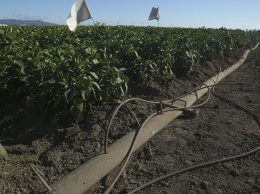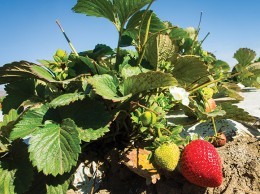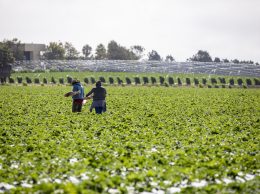Goleta farm fishes for sustainability
IN THIS ARTICLE
- Agribusiness Topic
- Marissa Wenzke Author
By Marissa Wenzke Friday, February 6th, 2015
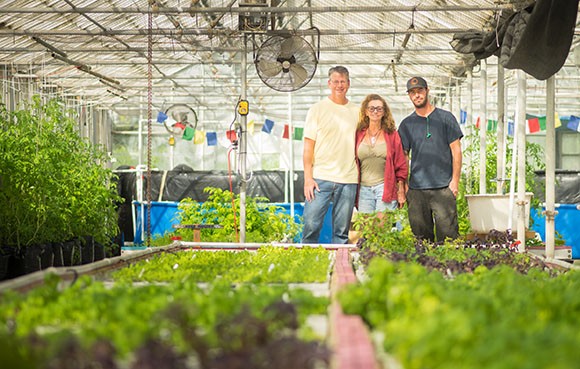
Miles and Linda Gassaway, from left, along with Linda’s son, John Edwards, founded Sustained Harvest Farms in Santa Barbara County last year. (Nik Blaskovich/Business Times photo)
Along the oceanside bluffs just north of Goleta, one farm is producing 20 to 25 varieties of organic produce using a sustainable farming method that uses as little as 10 percent of the amount of water used in traditional agriculture.
Working from two 10,000 square-foot greenhouses, Sustained Harvest Farms is a maze of commercial tubs filled with tiny fish and rows of trays that hold crops from green onions to rosemary. The farm uses aquaponics, a style of growing that’s essentially a cross between aquaculture — fish farming — and hydroponics, which involves growing crops in water.
“It’s pretty much just recreating an ecosystem,” said John Edwards, who co-owns and runs the operation with his mother Linda Gassaway and stepfather Miles Gassaway.
A UC Davis study on aquaponics has defined it as “the symbiotic cultivation of plants and aquatic animals in a balanced recirculating environment” and explains that fish provide nitrogenous waste that then serve as nutrients for the plants. Upon consuming the nutrients, the plants remove nitrogenous compounds from the water so it’s then clean for the fish.
Edwards first learned about aquaponics while attending the Solar Living Institute in Hopland, California in 2013. Within months, he and the Gassaways developed a business plan and contacted providers of aquaponics systems to investigate what would be right for them. By winter of 2013, they had set up a 300-gallon commercial tub in their backyard to test the waters.
“We put it up in about a month and the plants started growing within weeks,” Edwards said. “Once we saw how amazingly the plants were growing, we knew this was a good idea.”
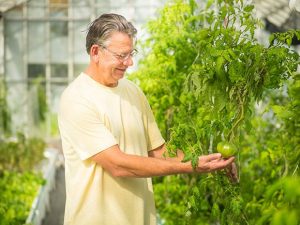
Sustained Harvest co-owner Miles Gassaway inspects tomato plants. (Nik Blaskovich/Business Times photo)
In early 2014, the family set out to establish a commercial operation, building off the plans of a grower in Hawaii called Friendly Aquaponics. As the Gassaways are former accountants and Edwards has primarily worked in the heating and air conditioning business, the new venture is a learning process as much as it is a blooming business.
“Farming is a lot of work,” said Miles Gassaway. “We have a new respect for farmers.”
Today the operation has its original 300-gallon system, plus several water tanks totaling 9,000 gallons that are filled with 5,000 koi fish, common goldfish and catfish.
With a small army of UC Santa Barbara interns, mostly environmental science majors, the 12,000 square-foot farm goes through about 200 gallons of water a week and its plants are harvested two to three weeks faster than in traditional farming. It sells its produce at the Goleta farmer’s markets, with plans to soon join UC Santa Barbara’s on-campus farmer’s market, and sells to a small group of restaurants and produce stands.
All of the produce is 100 percent USDA-certified organic as nutrients for the crops come solely from the fish, and the farm is capable of growing some crops off-season. Usually eating off-season fruits and vegetables means eating food with a harsher environmental impact, as it most likely has to be shipped thousands of miles from where it can be grown naturally. But with aquaponics, this moral trade-off is eliminated since such produce can be grown locally.
“We can actually grow a lot of stuff off-season,” Edwards said, adding that the farm sometimes grows certain produce according to what restaurants or retailers request, such as Santa Barbara-based Italian restaurant Toma.
Calling it “the future of farming,” Edwards said aquaponics can save not just a ton of water but a ton of cash as well on premium-quality organic produce. The farm hopes to someday operate on solar power, as they could then eliminate all use of petrochemicals, as well as one day open a small business installing aquaponics systems for others.
“We do want to establish a business where we go and install these systems in other people’s backyards,” he said. “You could save on your food bill for the rest of your life … instead of spending a bunch of money on certified organic produce.”


